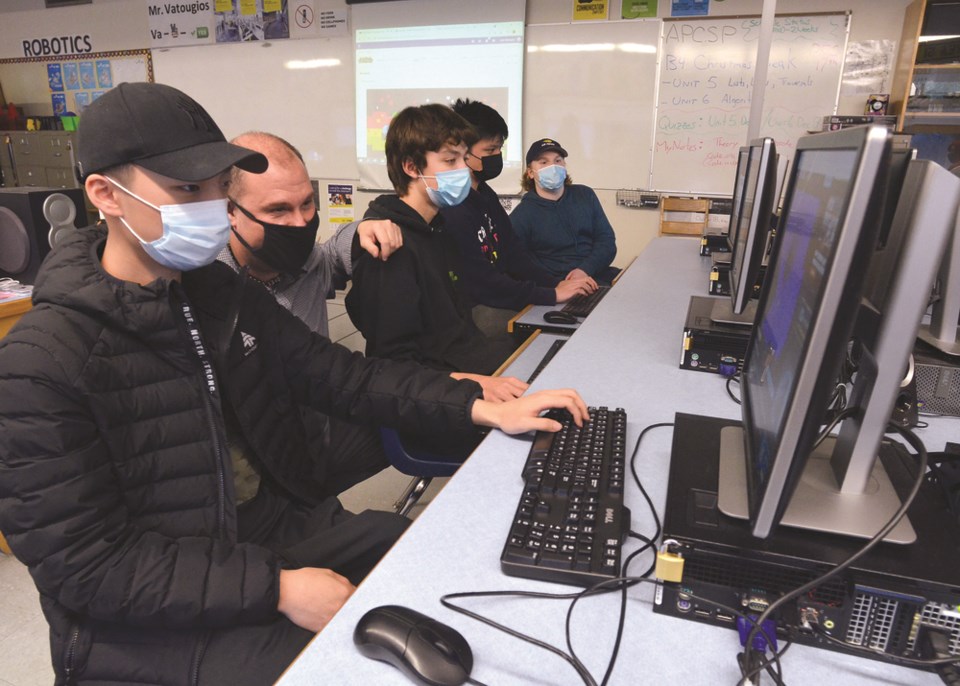When video games started in the 1980s, they usually involved teens with pockets full of quarters hanging out at the arcade.
Level up a few decades and online gaming has become a multi-billion-dollar industry, with its own celebrities, esport tournaments and lucrative business universe, playing out on streaming services like Twitch and YouTube.
But game streaming stars like Ninja and PewDiePie don’t happen overnight, and not without a lot of work behind the scenes.
Now, a proposed new high school business and gaming academy in North Vancouver is aiming to teach students that the world of professional video gaming has a lot to do with other business and marketing lessons.
“The people they see there who are super successful, they don’t just play video games,” said Justin Wong, vice-principal at Carson Graham Secondary and one of the North Vancouver educator behind the proposed academy. “There’s a lot of background work and a lot of traditional knowledge that goes into it.”
Business skills essential to streaming success
What Wong and Handsworth business teacher John Vatougios hope to do is download those skills needed to become successful in the business world – but do it through the lens of online gaming, a world in which many teens are already immersed.
“What a lot of people don't know is that it is an enormous, enormous activity in terms of revenue,” said Wong – esports pack an economic punch above many other major sports leagues. The gaming industry generated close to $180 billion in revenue in 2021, said Wong.
The economic world of video gaming involves not just the traditional creation of games by companies like Vancouver’s Electronic Arts, but also, increasingly, the world of gaming livestreamers, online celebrities in their own right, who share tips and observations on games with fans while playing them on platforms like Twitch and YouTube.
“They become their own brand,” said Wong – some streamers have created incredibly well-paying “channels.”
Another aspect of the business includes the producing of esport tournaments, where professional gamers face off against each other, often both in front of a live audience and an online audience around the world.
Esports acceptance growing
Just recently, “there was an international esports event in Romania. It was the League of Legends World Championship. And the final of that match was streamed online and viewed by four million people,” said Wong. “So definitely esports and gaming is gaining more and more acceptance in society.”
Most high schools on the North Shore already have esports clubs, said Wong, which offer teens who might not take part in more traditional sports a chance to connect with other kids who have shared interests.
The gaming academy being proposed would take that to another level, said Wong, by teaching business and marketing to a group of 25 to 30 students, focusing that around the esports world of video gaming.
The academy is proposing partnering with local companies already involved in that world, including Volcanic Media Group, which has a record of developing educational esports programs, and the Richmond-based Gaming Stadium, a company with a history of hosting esports tournaments.
Other partnerships with companies including Shaw, HyperX, Lenovo and Linus Media Group would help overcome any glitches in acquiring gaming laptops, peripherals and extra bandwidth.
Playing video games isn't the goal
The goal isn’t to make kids better at playing video games, said Wong. “It’s teaching business through a gaming lens.”
Among the skills Wong said the academy expects to teach are how to engage in e-commerce, how to develop and promote a brand and create marketing strategies, how to develop a social media marketing campaign, and how to co-ordinate and promote online events.
A portion of the curriculum would also focus on the dangers of video gaming addiction, and the need to maintain balance, said Wong. “It’s a legitimate concern. All video game players have that challenge sometimes.”
Handsworth Secondary is being suggested as the home base for the gaming academy, which could potentially start in September of next year. The program is being proposed for students in grades 10-12, at a cost of $1,750 per year.
Trustees of the North Vancouver Board of Education expect to formally consider the proposal in the new year.




